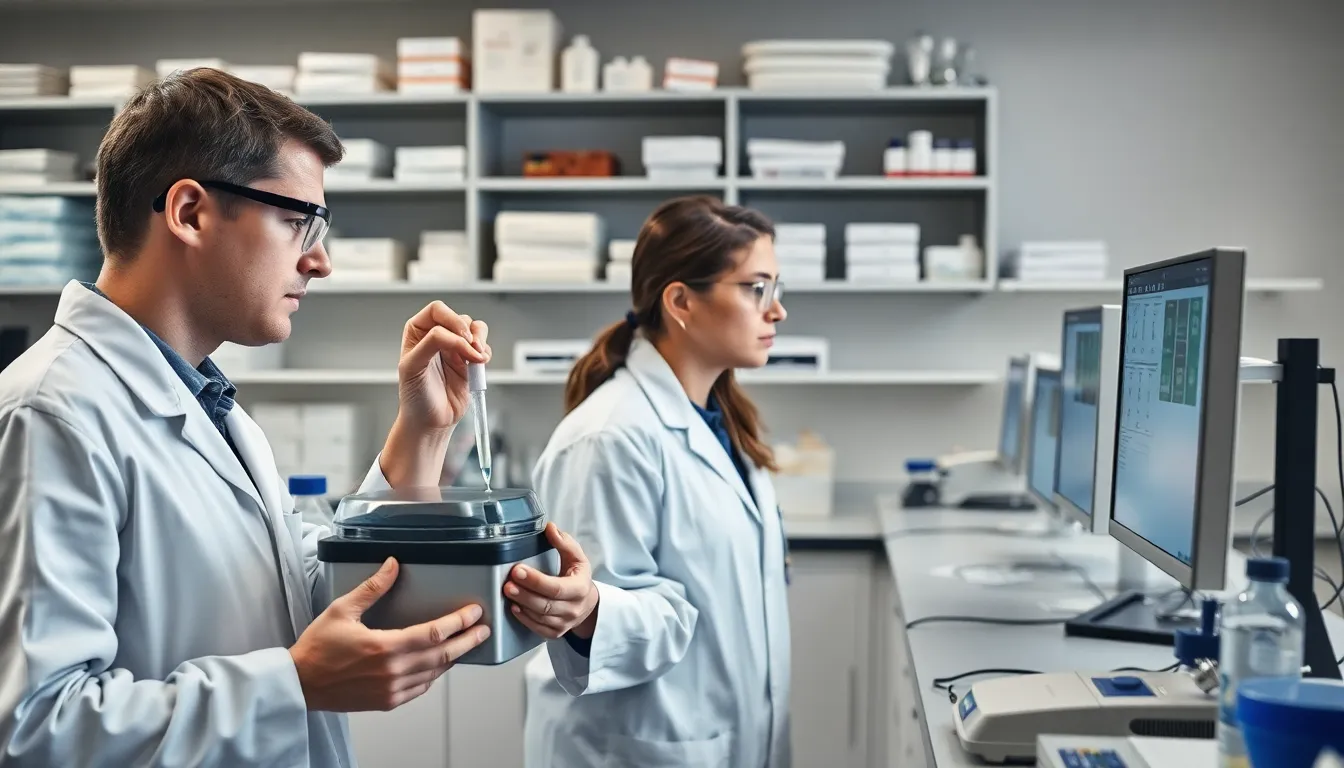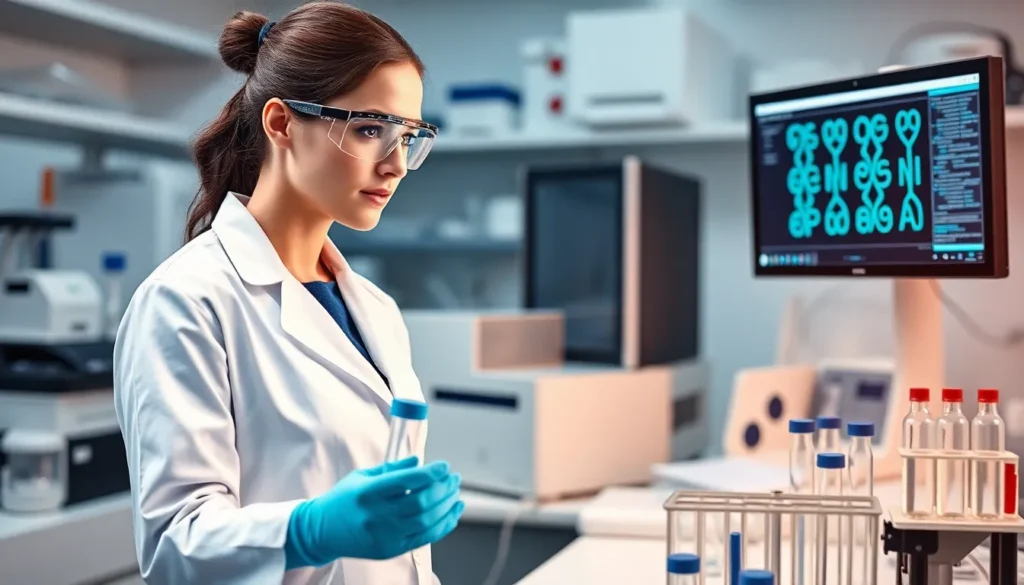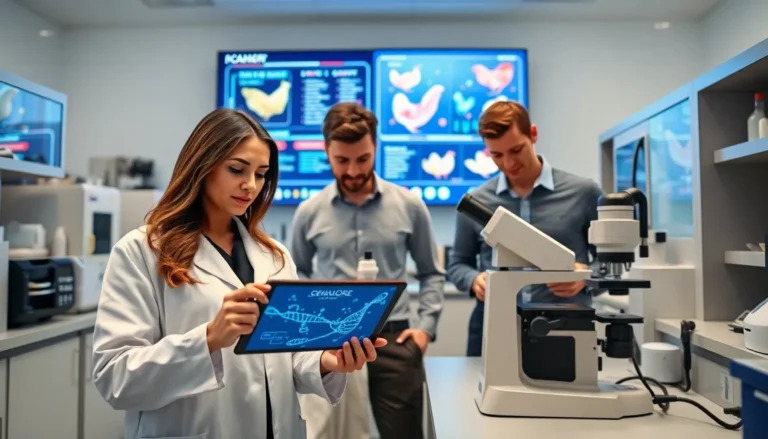In the rapidly evolving world of healthcare, biotech diagnostics stands at the forefront of innovation. These advanced technologies are revolutionizing how diseases are detected, monitored, and treated. By harnessing the power of biology and technology, biotech diagnostics offers unprecedented accuracy and speed, enabling healthcare professionals to make informed decisions that can save lives.
As the demand for personalized medicine grows, biotech diagnostics plays a crucial role in tailoring treatments to individual patients. From genetic testing to advanced imaging techniques, these tools not only enhance patient outcomes but also streamline clinical workflows. Understanding the impact and potential of biotech diagnostics is essential for anyone interested in the future of medicine.
Table of Contents
ToggleOverview of Biotech Diagnostics
Biotech diagnostics encompass technologies that leverage biological processes to diagnose diseases, guide treatment, and monitor health conditions. These diagnostics utilize tools such as biomarkers, genetic sequences, and proteomics, enabling precise disease identification.
Key technologies include:
- PCR (Polymerase Chain Reaction): PCR amplifies DNA, facilitating the identification of pathogens and genetic mutations in a rapid manner.
- Next-Generation Sequencing (NGS): NGS enables comprehensive sequencing of genomes, aiding in personalized medicine by providing detailed genetic insights.
- Microarrays: Microarrays detect thousands of genes simultaneously, essential for assessing gene expression profiles and identifying disease markers.
Applications of biotech diagnostics impact various fields:
- Oncology: Biotech diagnostics assist in tumor profiling, offering targeted therapies based on genetic characteristics of tumors.
- Infectious Diseases: Rapid detection of pathogens enhances outbreak response and treatment strategies.
- Chronic Disease Management: Continuous monitoring through biomarkers allows for timely interventions in diseases such as diabetes and cardiovascular disorders.
The significance of biotech diagnostics lies in their ability to provide timely and accurate results that drive informed medical decisions. As the demand for precision medicine grows, these advancements will continue to shape the landscape of healthcare.
Key Technologies in Biotech Diagnostics

Biotech diagnostics rely on advanced technologies that enhance disease detection and monitoring. The following subsections provide insights into prominent methods in this domain.
Molecular Diagnostics
Molecular diagnostics involve techniques that analyze genetic material, such as DNA and RNA, to identify diseases at a molecular level. Polymerase Chain Reaction (PCR) ranks among the most widely used methods, allowing rapid amplification of specific DNA sequences. PCR enables the detection of pathogens like bacteria and viruses within hours. Next-Generation Sequencing (NGS) offers comprehensive analysis of entire genomes, which aids in identifying mutations linked to various diseases, particularly cancers. Other key methods include reverse transcription PCR (RT-PCR) for RNA viruses, and Digital PCR for quantifying genetic material with high precision.
Immunoassays
Immunoassays utilize antigen-antibody interactions to detect specific substances in samples, such as blood or urine. Enzyme-Linked Immunosorbent Assay (ELISA) is a common method, widely adopted for its sensitivity and specificity in measuring proteins, hormones, and antibodies. This technique is critical in diagnosing conditions like HIV and certain autoimmune diseases. Lateral flow assays, often seen in point-of-care testing, provide rapid results for infectious diseases, including COVID-19, allowing immediate clinical decision-making. Signal amplification techniques, such as chemiluminescence, enhance the detection capabilities of immunoassays, leading to more accurate diagnoses.
Applications of Biotech Diagnostics
Biotech diagnostics have a broad range of applications across multiple sectors, significantly impacting clinical practice and agriculture. These applications enhance disease detection, treatment strategies, and agricultural productivity.
Clinical Applications
Clinical applications of biotech diagnostics focus on improving patient care through accurate disease detection and tailored treatment plans. Key areas include:
- Oncology: Biotech diagnostics enable tumor profiling, which assesses genetic mutations in cancer cells. This data guides targeted therapy choices and improves overall patient outcomes.
- Infectious Diseases: Rapid pathogen detection through molecular techniques like PCR allows for quick identification of infections. This swift response reduces transmission risks and improves management during disease outbreaks.
- Chronic Disease Management: Continuous monitoring of biomarkers assists in managing chronic conditions such as diabetes and cardiovascular diseases. Regular tracking allows healthcare providers to adjust treatment plans promptly.
- Genetic Disorders: Genetic testing identifies hereditary conditions by analyzing an individual’s DNA. Early detection facilitates preventive strategies and informed family planning.
Agricultural Applications
In agriculture, biotech diagnostics play a crucial role in enhancing food security and crop resilience. Key applications include:
- Plant Pathology: Diagnostic tools identify plant diseases at the molecular level. This detection allows farmers to implement targeted interventions, reducing crop losses.
- Genetic Improvement: Molecular markers help in the selection of desirable traits in crops. Breeders use these tools to accelerate the development of resilient varieties with enhanced yield and stress tolerance.
- Food Safety: Biotech diagnostics ensure food safety by detecting pathogens and chemical residues in food products. Regular testing helps maintain public health standards in the food supply chain.
- Environmental Monitoring: Diagnostics assist in assessing soil and water health. This information guides sustainable agricultural practices and minimizes environmental impacts.
Advancements and Innovations
Biotech diagnostics are experiencing rapid advancements, particularly in genetic analysis and testing efficiency. These innovations enhance disease detection and management across various sectors, significantly improving patient outcomes.
Next-Generation Sequencing
Next-Generation Sequencing (NGS) revolutionizes genomics by enabling comprehensive genome sequencing at unprecedented speed and accuracy. NGS technologies allow for the analysis of multiple genomes simultaneously, streamlining the process of identifying genetic mutations associated with diseases, including cancer. NGS plays a crucial role in personalized medicine, informing treatment plans tailored to individual genetic profiles. According to a report from the National Institutes of Health, NGS applications extend to rare disease diagnosis and pharmacogenomics, which assesses how genes affect drug response. The increasing accessibility of NGS platforms has significantly lowered costs, further driving its adoption in clinical laboratories and research institutions.
Point-of-Care Testing
Point-of-Care Testing (POCT) facilitates immediate diagnosis at or near the site of patient care, enhancing the speed and efficiency of medical decision-making. POCT technologies include portable devices capable of delivering rapid results for various conditions, such as glucose monitoring and infectious disease detection. The integration of advanced biosensors and microfluidics in POCT devices enhances sensitivity and specificity, allowing for accurate disease assessment in real-time. According to the World Health Organization, effective POCT strategies improve health outcomes, particularly in low-resource settings where laboratory infrastructure may be limited. These advancements in POCT contribute to timelier interventions and better management of chronic diseases, positioning them as critical tools in modern diagnostic practices.
Challenges and Limitations
Biotech diagnostics faces several challenges and limitations that impact its effectiveness in both clinical and agricultural applications.
- Regulatory Hurdles
Regulatory frameworks often lag behind technological advancements, resulting in delayed approvals for new diagnostic tests. Each country maintains its own standards, complicating global application.
- Cost Constraints
The development and implementation of biotechnology diagnostics frequently involve high research and production costs. Budget constraints can limit access to advanced diagnostic tools, particularly in low-resource settings.
- Technical Complexity
The techniques used in biotech diagnostics, such as NGS and PCR, require specialized skills and equipment. This technical complexity can restrict the widespread adoption and routine use in certain healthcare environments.
- Data Interpretation Challenges
The large volumes of data produced by advanced diagnostic technologies necessitate sophisticated bioinformatics tools for interpretation. Inadequate data analysis capabilities can lead to errors in diagnosis.
- Limited Awareness and Education
There remains a knowledge gap among healthcare providers regarding the latest diagnostic technologies and their applications. Insufficient training can hinder the effective use of these innovations in clinical practices.
- Sample Quality and Handling Issues
The reliability of biotech diagnostics depends heavily on the quality of biological samples. Poorly collected or stored samples can lead to inaccurate results, undermining diagnostic reliability.
- Ethical Considerations
Genetic testing raises ethical concerns, including privacy issues related to genetic data storage and analysis. The societal implications of certain diagnostic results also pose challenges for patient counseling and management.
- Market Competition
The rapid evolution of technology leads to intense competition among diagnostic companies. This competition can drive innovation but may also result in market saturation, complicating choices for healthcare practitioners.
These challenges demonstrate the need for ongoing efforts to improve the accessibility, reliability, and understanding of biotech diagnostics in healthcare and agriculture.
Biotech diagnostics are reshaping the landscape of healthcare and agriculture. Their ability to deliver precise and rapid results empowers healthcare professionals to make informed decisions that can save lives. As the demand for personalized medicine continues to rise, these innovative technologies play a crucial role in tailoring treatments to individual needs.
Despite the challenges faced in regulation and access, ongoing advancements promise to enhance the effectiveness and reach of biotech diagnostics. With tools like Next-Generation Sequencing and Point-of-Care Testing, the future looks bright for both patient care and agricultural practices. The integration of these diagnostics into everyday life not only improves health outcomes but also contributes to global food security, highlighting their significance in various sectors.










